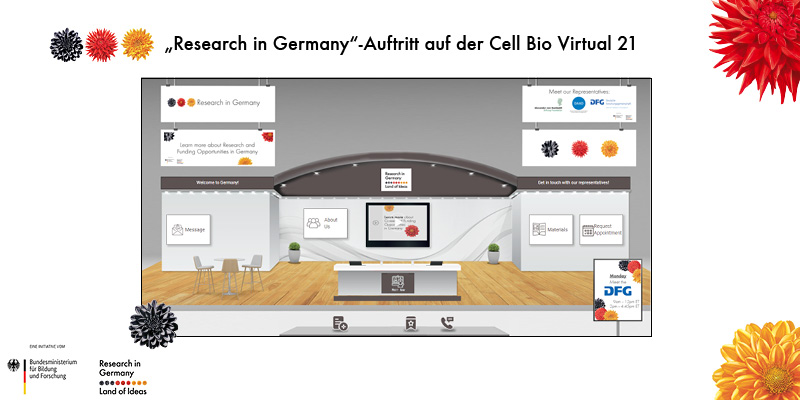Diverse “Research in Germany” activities at Cell Bio Virtual 2021
(16.12.21) Like so many other academic conferences, “Cell Bio” – the meeting between the American Society for Cell Biology (ASCB) and the European Molecular Biology Organization (EMBO) – had to be hosted virtually for the second year running due to the ongoing COVID-19 pandemic. With around 3,500 participants from over 65 countries, “Cell Bio” is considered the world’s largest virtual forum for researchers in the field of cell biology and once again set itself the goal of enabling its diverse community to engage with the brightest minds in the field of cell biology.

Research in Germany Stand_CellBio21
© DFG
“Research in Germany” present in both conference weeks
The first week of the conference, entitled “Education and Professional Development Week”, was dedicated to early career academics, inviting them to participate in different sessions each day which dealt not just with cell biology itself but also with subjects relating to diversity and inclusion.
Under the auspices of the DFG, the “Research in Germany” initiative also took part, offering special sessions for early career researchers. In one particularly well-attended online session entitled “Funding Programs for Your Research in Germany”, international academics in the field of cell biology had the opportunity to find out about funding programmes offered by the German Academic Exchange Service, the Alexander von Humboldt Foundation and the DFG. Following brief presentations, there was an opportunity to ask in-depth and individual questions at a Q&A session.
In the second week of the conference, participants were invited to attend “Scientific Sessions, Award Presentations, and Exhibitor Tech Talks”. Daily poster sessions, mini symposia and Q&A rooms with symposium speakers further promoted networking and cooperation among researchers. In addition, the online conference platform gave visitors the opportunity to find out about what exhibitors had to offer in a virtual exhibition hall; they could also open their own networking spots to engage in dialogue and view a range of different posters.
At the large “Research in Germany” exhibitor stand, participants were able to view and download various information materials (such as brochures). “Research in Germany” offered Cell Bio participants several opportunities to make live contact with representatives of the initiative at the exhibitor stand and find out about research and funding opportunities in Germany in general, as well as obtain advice on Germany as a research location and on individual funding options.
All in all, the “Research in Germany” offerings at Cell Bio were very much appreciated and well received. This level of demand also shows that interest in international cooperation in the field of cell biology remains unbroken, even during the ongoing pandemic.
Many thanks to all institutions involved:
- German Academic Exchange Service (DAAD
- German Research Foundation (DFG
- American Friends der Alexander-von-Humboldt Gesellschaf
Further information on the conference:
Further information on the “Research in Germany” initiative: